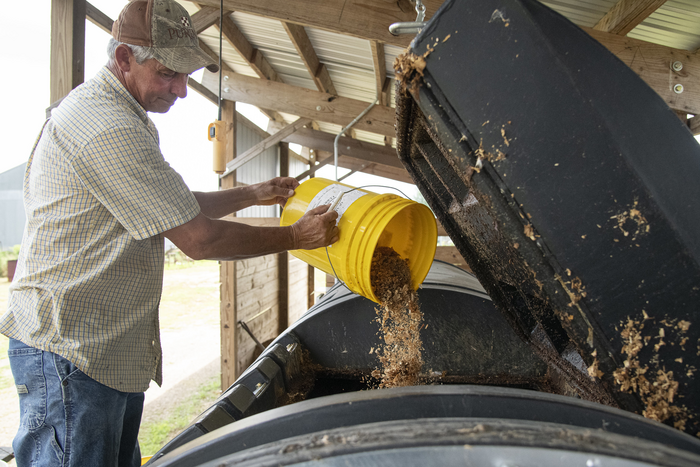Vermonters largely support laws on food scraps and single-use plastics, but some are confused about composting rules, and frustrated with the state’s inability to compost biodegradable containers and tableware.

Credit: USDA/public domain.
Vermonters largely support laws on food scraps and single-use plastics, but some are confused about composting rules, and frustrated with the state’s inability to compost biodegradable containers and tableware.
These takeaways are from the first research yet to tackle the state’s pioneering food waste laws—Act 148 (food scraps) and Act 69 (single-use plastics)—since coming into effect on July 1, 2020.
“Vermont was the first state in the country to legally require residents and businesses to divert food scraps from their trash,” said lead researcher Emily Belarmino of the University of Vermont. “These new findings will help policymakers here, and in other states, looking to learn from our experience.”
Two UVM research reports were released today. The first report investigates the law addressing food waste—the Universal Recycling law (Act 148). To reduce the harmful impacts of food waste in Vermont landfills—especially the generation of methane, a powerful greenhouse gas—the law requires all residents, businesses, and institutions to keep their food scraps out of the trash.
Key findings on the food waste law’s impacts:
- Most Vermonters (85%) are composting, and 61% report feeling a “moral obligation” to keep food scraps out of landfills.
- Residential food scrap separation increased 48% with backyard composting as the leading method.
- Over a quarter of Vermonters (26%) are confused about the rules of the food waste ban, and one-fifth of households that compost (20%) characterize it as hard or very hard.
- Businesses’ support is high, but restaurants report more negative impacts on costs and revenues than food retailers.
- Ongoing challenges: access to composting facilities in apartments and condos, winter composting, and general composting education.
A second research report looks at single-use plastics (Act 69). To reduce the harmful environmental impacts of single-use plastics, Vermont’s law prohibits stores and food service establishments from providing single-use plastic carryout bags at the point of sale, or Styrofoam food and beverage containers, plastic straws (except upon customer request), and plastic stirrers. Additionally, the law permits stores to provide single-use paper bags if the customer is charged at least 10 cents per bag.
Key findings on Vermont’s single-use plastics law’s impacts:
- Vermonters now bring home 6 fewer plastic bags per week on average.
- Businesses say charging for paper bags is the law’s most challenging requirement.
- Businesses identify Vermont’s inability to compost or recycle biodegradable takeout meal containers and tableware as a source of frustration.
- Most Vermonters (66%) say the environmental benefits of the plastic bag ban outweigh the economics costs.
- Restaurants and other food service businesses reported more negative impacts than food retailers.
The research is based on two key sources of data: a 2022 consumer survey in the annual statewide Vermonter poll completed by nearly 800 residents, and a 2021-22 business survey of nearly 100 food service and food retail professionals.
“This research shows that businesses and consumers have been surprisingly supportive of these laws—given the occasionally fierce debates early on—even as new costs have been introduced,” said Belarmino, a researcher from the Gund Institute for Environment and UVM’s College of Agriculture and Life Sciences. “That said, people still need more education about the law and composting, in general. And food businesses want help identifying low-cost alternatives to single-use plastics that are accepted by local recycling and/or composting facilities.”
Support and frustration
The research includes powerful testimonials from residents and businesses. “We tried to implement this ban [on plastics] before the law and received lots of negative feedback from customers,” said one food retail owner. “By having it come via litigation, adoption was immediate and no customer pushback since it wasn’t only us. The law made it easy, painless, and awesome.”
Another owner of a food retail and service business said: “We worked very hard on converting our single-use [plastics] to be either recyclable or compostable to be in compliance… a few months ago [we] found out Chittenden Solid Waste District (CSWD) would no longer accept many of the compostable products we switched to… This is extremely frustrating, and we’ve switched back to… cheaper, non-compostable products since it’s all trash now anyway.”
Cleaning up landfills
Americans produce a pound of food waste daily—with significant adverse environmental impacts, according to past UVM research. Food waste is among the largest categories of material in landfills in the U.S. and Vermont, generating methane as it breaks down. Landfills are the third largest source of U.S. methane emissions (17%), after petroleum production and livestock farming.
Plastics make up nearly one-fifth of products in U.S. landfills—one-eighth in Vermont’s municipal landfill—and contribute to harmful environmental impacts, including the pollution of soils, freshwater, and marine ecosystems with microplastics.
The UVM research follows a recent state report on solid waste that finds Vermont is not yet meeting the state’s goal of recycling and composting half of its total waste.
Read the two research reports—Impact of Vermont’s Food Scraps Ban (Act 148): Evidence from Consumers and Food Businesses and Impact of Single Use Plastic Products Legislation (Act 69) on Consumers and Food Businesses: Evidence from Vermont. The research team included Emily Belarmino, Claire Ryan, Qingbin Wang, Meredith Niles and Margaret Torness.
Article Title
Impact of Vermont’s Food Waste Ban on Residents and Food Businesses
Article Publication Date
30-Jan-2023




